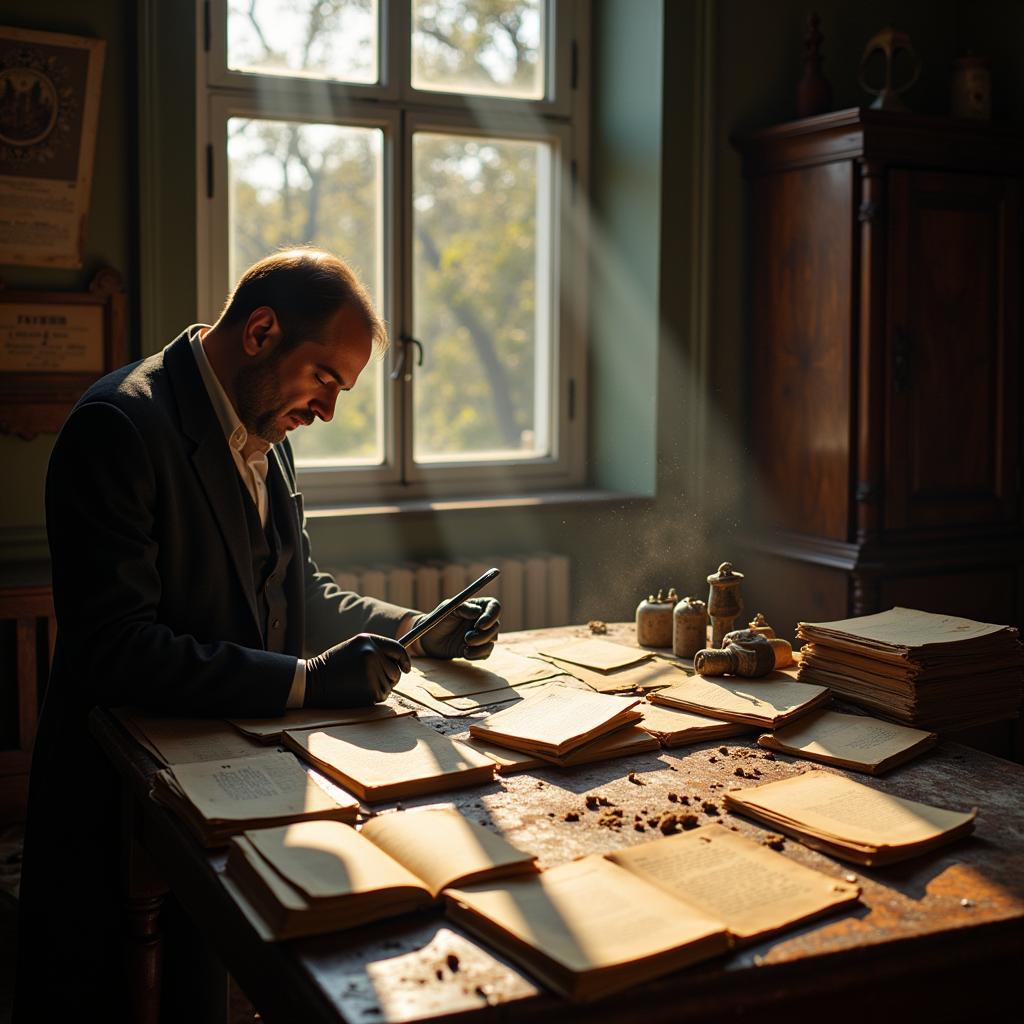Methodology In Historical Research is the systematic process used to investigate past events and phenomena. It involves carefully selecting sources, critically evaluating their validity, and synthesizing information to construct a coherent narrative of the past. This process is crucial for understanding the complexities and nuances of history, as well as for drawing meaningful conclusions about past societies and events. See, even paranormal research, in its own way, relies on historical data! We need to understand what came before to appreciate the now.
Historical research methodologies vary depending on the specific research question and the available sources. However, some common principles and methods guide the process. These methods ensure rigor and validity in the interpretation of historical evidence. Let’s dive into the key aspects of methodology in historical research.
Source Criticism: The Foundation of Historical Methodology
Source criticism is the cornerstone of historical methodology. It involves evaluating the authenticity, credibility, and overall value of historical sources. This is especially true in my field, as stories of the paranormal often rely on eyewitness accounts passed down through generations. Historians categorize sources into primary and secondary sources.
Primary Sources: A First-Hand Look at the Past
Primary sources are firsthand accounts or artifacts created during the period under study. They provide direct evidence of past events. Examples include letters, diaries, photographs, official documents, and archaeological remains. Think of these as the equivalent of EVP recordings or thermal images in paranormal research – they offer a glimpse into the event itself, rather than a later interpretation.
Secondary Sources: Interpreting the Past
Secondary sources are interpretations and analyses of primary sources created after the period being studied. They offer valuable perspectives and context. Books, journal articles, and documentaries are common examples. Similarly, a book analyzing supposed Bigfoot sightings could be considered a secondary source in cryptozoology.
Historical Research Methods: Unraveling the Past
Several key methods are employed in historical research to analyze sources and build a cohesive narrative.
External Criticism: Authenticating the Evidence
External criticism verifies the authenticity of a source. This involves examining physical characteristics, such as handwriting, paper type, and seals, to determine if a document is genuine. For example, when investigating a supposedly haunted artifact, we might use carbon dating to verify its claimed age.
Internal Criticism: Assessing Credibility
Internal criticism assesses the credibility of the content within a source. It considers the author’s biases, motives, and the consistency of the information presented. This process involves comparing different accounts, corroborating evidence, and identifying potential errors or distortions. Even in seemingly objective fields, researcher bias can influence interpretation.
Contextualization: Placing Events in Perspective
Contextualization involves placing historical events within their broader social, political, economic, and cultural context. This helps researchers understand the motivations, beliefs, and actions of people in the past. For instance, understanding the social anxieties of the Victorian era can shed light on the popularity of spiritualism during that time.
 Analyzing Primary Sources in Historical Research
Analyzing Primary Sources in Historical Research
The Importance of Objectivity in Historical Research
Objectivity is a crucial goal in historical research. While complete objectivity may be unattainable due to the subjective nature of interpretation, historians strive to minimize bias and present a balanced account of the past. This involves acknowledging limitations, considering multiple perspectives, and being transparent about their methodology.
Challenges in Historical Research
Historical research faces several challenges, including incomplete records, biased sources, and the difficulty of reconstructing past experiences. Historians must grapple with gaps in the historical record and acknowledge the limitations of their interpretations.
search engine for research papers
What are the common pitfalls in historical research methodology?
One common pitfall is presentism, the tendency to impose present-day values and perspectives onto the past. Another challenge is confirmation bias, the tendency to favor evidence that supports pre-existing beliefs. Historians must be vigilant against these biases to ensure the integrity of their research.
How does historical research methodology contribute to our understanding of the present?
By studying the past, we gain valuable insights into the origins of present-day issues, institutions, and social structures. Historical research helps us understand the long-term consequences of past decisions and actions, providing a framework for informed decision-making in the present.
a research objective should specify
Conclusion
Methodology in historical research is essential for constructing a reliable and nuanced understanding of the past. By employing rigorous methods of source criticism, contextualization, and analysis, historians can uncover hidden truths and challenge existing narratives. This process, though challenging, offers invaluable insights into the human experience and the forces that have shaped our world. Just like in Paranormal Research, a systematic and critical approach is key to uncovering the mysteries that lie hidden beneath the surface.
hr topics for research project
FAQ
- What is the difference between primary and secondary sources?
- What are the main methods of source criticism?
- How can I avoid bias in historical research?
- What are some common challenges in historical research?
- Why is contextualization important in historical research?
- How can historical research inform our understanding of the present?
- Where can I find reliable historical sources?
Need Help with Your Historical Research?
Contact us for support!
Phone: 0904826292
Email: research@gmail.com
Address: No. 31, Alley 142/7, P. Phú Viên, Bồ Đề, Long Biên, Hà Nội, Việt Nam
Our customer service team is available 24/7.